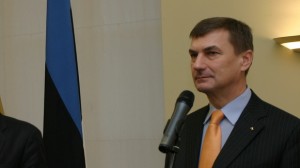
Entering the eurozone has been a long-standing goal of Prime Minister Andrus Ansip's (pictured above) government.
TALLINN — Prime Minister Andrus Ansip scoffed at the European Commissioner for Monetary Affairs Olli Rehn’s doubts that Estonia will get the euro by 2011.
Estonia has had its sights set on gaining entry to the eurozone for the last couple of years, but now with the Greek debt crisis shaking the EU, it looks like the Baltic country’s application may be delayed.
Rehn said Wednesday that [private_supervisor]Estonia’s euro adoption in 2011 remains uncertain despite the country’s low government deficit and government debt stay under Maastricht criteria.
Rehn made it clear that the European Commission will evaluate the newcomer’s budget and inflation figures carefully partly because of Greek’s current fiscal struggle. Also Fitch’s analysts have questioned Estonia’s eurozone entry in 2011.
Neither Ansip nor the Finance Minister Jürgen Ligi agree with the assessment, suggesting at the government’s press conference Thursday that the European Commission can only evaluate the Maastricht criteria, which Estonia has clearly fulfilled.
“What else should Olli Rehn have said?” Ansip asked the media. “There are all sorts of analysts and there have been announcers from everywhere, I would not go along with them.”
Ligi added that Rehn must represent the current situation where nothing is certain. However, the commission’s strong support is known and the country’s position is considered to be good.
“Rehn is not the one to say that Estonia has not done its job. Fulfilling the criteria must show that,” said Ligi.
If Estonia should face the black scenario, though, Ansip insisted that with or without the euro, conservative budget politics have been good for the country. [/private_supervisor] [private_subscription 1 month]Estonia’s euro adoption in 2011 remains uncertain despite the country’s low government deficit and government debt stay under Maastricht criteria.
Rehn made it clear that the European Commission will evaluate the newcomer’s budget and inflation figures carefully partly because of Greek’s current fiscal struggle. Also Fitch’s analysts have questioned Estonia’s eurozone entry in 2011.
Neither Ansip nor the Finance Minister Jürgen Ligi agree with the assessment, suggesting at the government’s press conference Thursday that the European Commission can only evaluate the Maastricht criteria, which Estonia has clearly fulfilled.
“What else should Olli Rehn have said?” Ansip asked the media. “There are all sorts of analysts and there have been announcers from everywhere, I would not go along with them.”
Ligi added that Rehn must represent the current situation where nothing is certain. However, the commission’s strong support is known and the country’s position is considered to be good.
“Rehn is not the one to say that Estonia has not done its job. Fulfilling the criteria must show that,” said Ligi.
If Estonia should face the black scenario, though, Ansip insisted that with or without the euro, conservative budget politics have been good for the country. [/private_subscription 1 month] [private_subscription 4 months]Estonia’s euro adoption in 2011 remains uncertain despite the country’s low government deficit and government debt stay under Maastricht criteria.
Rehn made it clear that the European Commission will evaluate the newcomer’s budget and inflation figures carefully partly because of Greek’s current fiscal struggle. Also Fitch’s analysts have questioned Estonia’s eurozone entry in 2011.
Neither Ansip nor the Finance Minister Jürgen Ligi agree with the assessment, suggesting at the government’s press conference Thursday that the European Commission can only evaluate the Maastricht criteria, which Estonia has clearly fulfilled.
“What else should Olli Rehn have said?” Ansip asked the media. “There are all sorts of analysts and there have been announcers from everywhere, I would not go along with them.”
Ligi added that Rehn must represent the current situation where nothing is certain. However, the commission’s strong support is known and the country’s position is considered to be good.
“Rehn is not the one to say that Estonia has not done its job. Fulfilling the criteria must show that,” said Ligi.
If Estonia should face the black scenario, though, Ansip insisted that with or without the euro, conservative budget politics have been good for the country. [/private_subscription 4 months] [private_subscription 1 year]Estonia’s euro adoption in 2011 remains uncertain despite the country’s low government deficit and government debt stay under Maastricht criteria.
Rehn made it clear that the European Commission will evaluate the newcomer’s budget and inflation figures carefully partly because of Greek’s current fiscal struggle. Also Fitch’s analysts have questioned Estonia’s eurozone entry in 2011.
Neither Ansip nor the Finance Minister Jürgen Ligi agree with the assessment, suggesting at the government’s press conference Thursday that the European Commission can only evaluate the Maastricht criteria, which Estonia has clearly fulfilled.
“What else should Olli Rehn have said?” Ansip asked the media. “There are all sorts of analysts and there have been announcers from everywhere, I would not go along with them.”
Ligi added that Rehn must represent the current situation where nothing is certain. However, the commission’s strong support is known and the country’s position is considered to be good.
“Rehn is not the one to say that Estonia has not done its job. Fulfilling the criteria must show that,” said Ligi.
If Estonia should face the black scenario, though, Ansip insisted that with or without the euro, conservative budget politics have been good for the country. [/private_subscription 1 year]
— This is a paid article. To subscribe or extend your subscription, click here.












